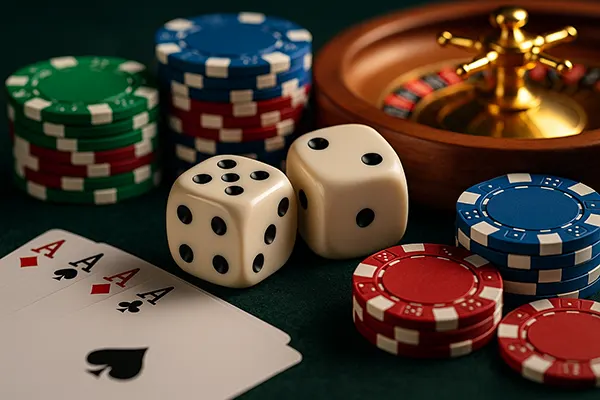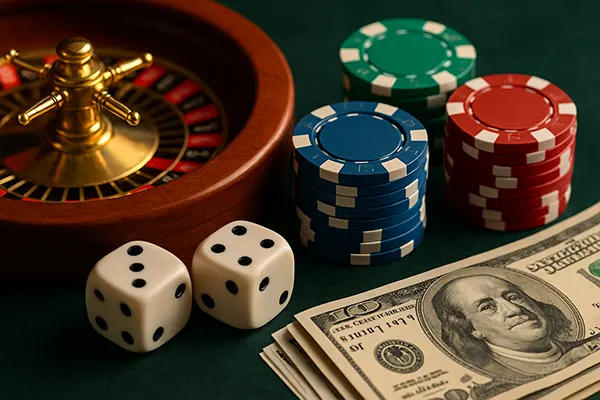
Probability Mathematics: How Odds in Gambling Truly Work
Behind every game of chance lies a system of numbers, probabilities, and mathematical calculations. Understanding how odds function provides clarity on why casinos always maintain an advantage and what players can realistically expect when participating. In 2025, with gambling becoming increasingly data-driven, the concept of probability is more important than ever for players who want to approach games with knowledge rather than assumptions.
The Role of Probability in Gambling
Probability is the foundation of all gambling activities. Whether it is roulette, blackjack, poker, or slot machines, every possible outcome can be measured by mathematical likelihood. These probabilities are calculated in advance by game developers and verified by regulators to ensure fairness. For instance, rolling a die has a one-in-six chance of landing on a specific number, while drawing a particular card from a standard deck has a one-in-fifty-two chance.
Casinos design their games so that while wins are possible, the overall balance ensures the house retains an advantage. This concept is often referred to as the “house edge.” It represents the average percentage that the operator expects to keep over the long run. For example, European roulette has a house edge of 2.7%, meaning that for every £100 wagered, the expected return for players is £97.30.
Understanding probability is crucial not only for recognising the true chances of winning but also for developing realistic expectations. Players who grasp these principles are less likely to misinterpret random results as patterns and more likely to enjoy gambling as entertainment rather than a guaranteed way to profit.
House Edge and Return to Player (RTP)
Two key mathematical terms dominate discussions about gambling fairness: house edge and Return to Player (RTP). The house edge indicates the built-in advantage for the casino, while RTP reflects the average percentage of total stakes returned to players over time. If a slot has an RTP of 96%, this means that statistically, £96 is returned to players for every £100 staked, though the distribution of wins is random and uneven.
RTP is always calculated over millions of spins or hands, which is why short-term sessions may vary greatly from the long-term expectation. This explains why one player might win a jackpot in minutes while another may lose steadily over hours. Both outcomes align with the same probability model, but randomness dictates the short-term results.
By combining knowledge of house edge and RTP, players can identify which games offer better value. Although no strategy can eliminate the house edge, informed choices can reduce losses and extend playtime, making gambling a more controlled activity.
Randomness and Statistical Models
Another crucial element in understanding odds is randomness. Modern games use Random Number Generators (RNGs) to ensure outcomes are unpredictable. These algorithms are tested by independent laboratories to confirm compliance with fairness standards. The role of randomness is to simulate true unpredictability, so no player or casino can predict or manipulate outcomes.
Randomness is not the same as chaos. While results appear completely unpredictable, they follow strict statistical models. For example, the probability of hitting a winning combination in slots is determined by the number of symbols and reels. Over time, the frequency of payouts will align with the advertised RTP, even though the exact sequence of wins and losses remains unknown.
Players often fall victim to the “gambler’s fallacy,” believing that past results influence future outcomes. For instance, after several losses, one might assume a win is “due.” However, each spin or hand is independent, and previous results do not alter the probability of future outcomes. This misunderstanding frequently leads to unrealistic betting strategies and financial losses.
Variance and Volatility in Games
Beyond RTP, games are also categorised by variance or volatility. Low-variance games provide frequent but smaller wins, while high-variance games offer rarer but larger payouts. For example, a low-variance slot might return small winnings every few spins, whereas a high-variance slot could lead to long losing streaks followed by a significant jackpot.
Volatility is an essential factor in shaping player experience. Those who prefer longer play sessions may enjoy low-variance games, while players chasing big rewards might opt for high-variance titles. Recognising variance allows players to match games to their risk tolerance and budget, making gambling less stressful and more strategic.
In 2025, developers increasingly highlight variance levels in game descriptions, helping players make informed decisions. This transparency reflects broader industry efforts to promote responsible gambling and ensure participants fully understand the risks associated with different types of games.

Practical Applications of Probability for Players
Although probability does not allow players to beat the house, it does provide tools to make more rational choices. Knowledge of odds helps gamblers manage expectations, select suitable games, and control bankrolls more effectively. For example, blackjack players who use basic strategy reduce the house edge to less than 1%, making it one of the most statistically favourable games.
In poker, understanding probability is fundamental for calculating pot odds and expected value. Skilled players rely on mathematics to decide when to call, raise, or fold, using statistical reasoning rather than intuition. This combination of probability and psychology sets poker apart from games of pure chance, allowing for a higher degree of skill-based decision-making.
For casual players, probability knowledge reduces misconceptions and reliance on myths. Recognising that every game is designed with a long-term mathematical edge helps individuals enjoy gambling as entertainment without unrealistic expectations of profit.
Responsible Gambling and Probability Awareness
Awareness of probability plays a central role in responsible gambling practices. By acknowledging that odds are always in favour of the house, players can set realistic budgets and limits. Understanding that wins and losses are outcomes of probability models encourages responsible behaviour and prevents the development of problematic gambling habits.
Modern gambling regulators in 2025 require operators to present clear information about RTP, variance, and responsible gaming resources. This approach empowers players to make informed decisions based on mathematics rather than illusions of control or luck-based myths.
Ultimately, probability mathematics is not just an abstract theory but a tool for players to protect themselves, enjoy gambling responsibly, and approach games with knowledge. By understanding how odds truly work, players gain clarity, reducing risks while still appreciating the entertainment value of the activity.
